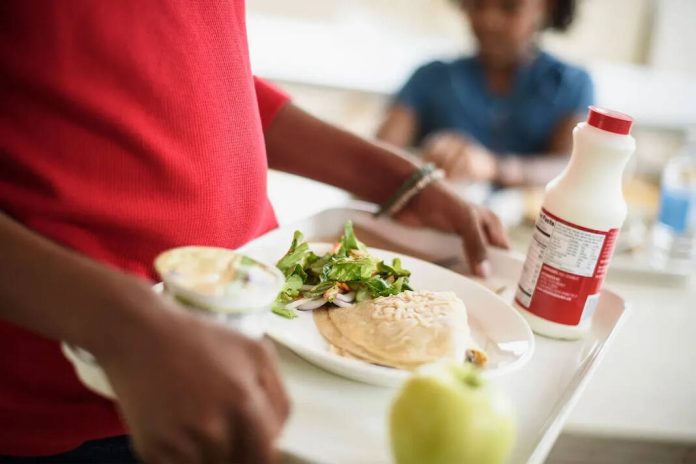Although a new report indicates an ongoing nationwide drop in the number of children who participated in free summer meals last year, data shows Indiana bucked the trend with more Hoosier kids receiving lunches in 2023 than in 2022.
The report released Tuesday by the Food Research & Action Center revealed (FRAC) that 170,926 fewer children benefited from meals served through the Summer Nutrition Programs in 2023 compared to the previous year. That means only 15.3 children received summer lunch for every 100 who received a free or reduced-price school lunch during the previous school year.
But in Indiana, more than 72,000 children participated in free summer lunches on an average day in July 2023 — a nearly 33% increase from 2022. By comparison, 17.3 Hoosier kids ate summer lunch for every 100 who participated in the free and reduced program during the academic year.
Participation rates for breakfast still show room for improvement, however. According to FRAC’s analysis, 15,157 Hoosier children received breakfast on an average day in July 2023. That’s an increase of about 11.4% compared to July 2022, but still far less than during the COVID-19 pandemic. In 2021, for example, 73,666 Hoosier kids received free breakfast during the summer.
The overall 2023 participation boost follows a drop in 2022 — though there were previous summer meal increases in 2020 and 2021.
Child nutrition waivers issued by the U.S. Department of Agriculture make free meals available at summer meal sites, often located at schools and community centers.
Access was expanded during the pandemic, and until 2023, federal waivers allowed meal sites to operate in all communities and offer meals that families could pick up and take home off-site consumption. Most sites have since reverted to pre-pandemic operations, meaning fewer kids can access free meals.
FRAC, a national nonprofit that aims to reduce poverty-related hunger, releases its summer nutrition report annually. Data is delayed a year however; the newest report highlights summer lunches in 2023, and 2024 numbers won’t be available for another year.
“The summer should be about play, adventure, and friends, not rumbling stomachs. Summer meals help keep hunger at bay, so that children can enjoy their break and return to school in the fall healthy and ready to learn,” said Crystal FitzSimons, interim president at FRAC, in a statement.
“Maximizing the opportunities available this summer and beyond will be critical to ensuring that children have the nutrition, and the education and enrichment programming, they need to learn and thrive,” FitzSimons continued. “Now is the time to recommit to ending summer hunger, and more must be done.”
Numbers improve, but still low overall
Across the country, most other states saw a decrease in the average daily participation in summer lunch in July 2023 compared to July 2022, according to FRAC.
Nationwide participation for lunch in July 2023 was slightly higher than pre-pandemic levels: 30,533 additional children participated in July 2023 when compared to July 2019, the last summer before the pandemic.
Participation for breakfast in July 2023 was 15.9% lower than July 2022, with 287,096 fewer children participating in 2023, according to the FRAC report.
Even so, Indiana ranked bottom in the country for the ratio of kids who ate both free lunches and breakfasts. Out of every 100 students who ate a summer lunch, only 25 were also served a free breakfast, according to the FRAC data.
Nutrition advocates emphasized that many Indiana families continue to struggle with hunger and food insecurity.
FRAC, specifically, is calling on federal lawmakers to make summer meals “more accessible,” including by making more communities eligible to provide summer meals, allowing all sites to serve three meals (instead of two), streamlining operations so summer sites can operate after school and on weekends during the school year, and providing more funding for summer programs, “so that more children have access to the meals and the educational and enrichment activities they need during the summer to return to school well-nourished and ready to learn.”
Summer meal options
The two federal summer nutrition programs — the Summer Food Service Program and National School Lunch Program — provide funding to serve meals and snacks to children at sites during summer vacation or the extended breaks of year-round schools. The programs also can be used to feed children during unanticipated school closures.
The SFSP is a federally-funded, state-administered program that reimburses approved program operators who serve free, healthy meals and snacks to children under age 18 in low-income areas when school is not in session.
Sponsorship is open to public and private nonprofit groups, including local governments, summer camps, religious organizations and recreation centers. Organizations may also consider partnering with an existing sponsor, such as a school corporation, to serve students in areas where kids lack good nutrition during the summer months.
Separately, the NSLP is available for schools that operate summer school. Only the students enrolled in summer school can receive a meal, however.
The latest FRAC report indicates the number of SFSP sponsors and sites was practically the same from July 2022 to July 2023. The data shows there were 164 sponsors and 810 sites statewide that provided summer meals in July 2023.
To complement summer meals, the Summer Electronic Benefit Transfer Program, a new permanent program, launched this summer.
Thirty-seven states, including Indiana, are participating, according to the USDA. Eligible families received $120 in federally funded grocery benefits on an EBT card for each school-age child who is eligible for free or reduced-price school meals.
Some 669,000 school-aged kids in Indiana were eligible, according to FRAC. It’s not yet clear how many actually participated.
By Casey Smith — The Indiana Capital Chronicle is an independent, not-for-profit news organization that covers state government, policy and elections.





